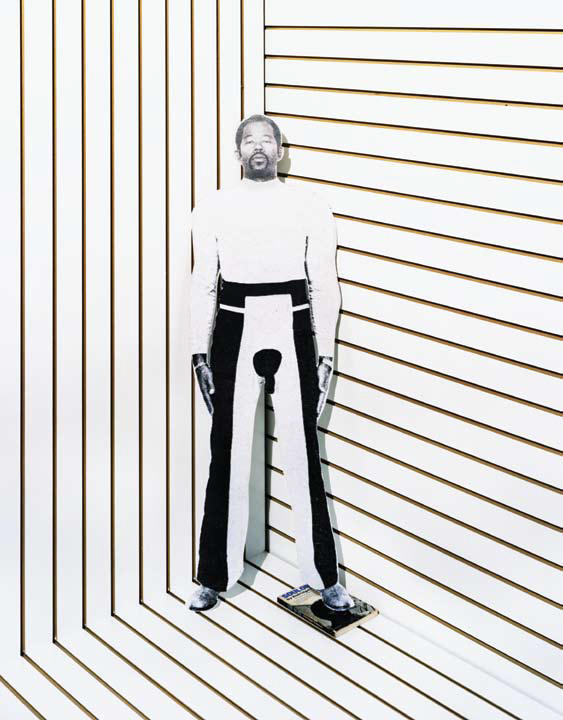
We are a very sick country. I, perhaps, am sicker than most.
—Eldridge Cleaver
Never come between a black man and his hustle in a room full of white people.
—Anonymous
If you board the wrong train, it is no use running along the corridor in the other direction.
—Dietrich Bonhoeffer
In 1975, Eldridge Cleaver, having tried his hand at petty crime, insurrectionary sexual assault (so-called), essay writing, public relations, civil rights activism, US presidential politics, and paramilitary training, decided to become a fashion designer. The menswear line he produced while on the run in Cuba, Algeria, and France (his line was waggishly called Eldridge de Paris) has faded nearly completely from memory, with the exception of one novel sartorial affectation: the Cleaver Sleeve.
Essentially a sock-like codpiece affixed to tight-fitting, flat-front slacks, the Cleaver Sleeve put the male member on permanent display, abolishing the “crime of indecent exposure” in favor of its vaguely worded opposite, “decent exposure.” He explained the concept to an interviewer: “I’ve always been keen about sex. I like it. So you know the whole thing about the Kama Sutra — there’s something to learn there, right?” He was a “tantric guru” now, he said, “a label I bestowed upon myself, because I know who I am. I’ve mastered it. That’s why I made these pants.”
Is there a word in the English language capable of capturing the perverse blend of affection and gratitude we feel for our negative role models? It’s not the same as the admiration or envy we feel for an illustrious or beloved ancestor. It often hangs on a tale, and we feel a guilty thankfulness for the stocks of anecdote and misadventure these unwittingly instructive men and women, our cautionary object lessons, have provided. They wriggle and wrong-turn, they struggle and, now and then, die — not for our sins, but for our edification. But to be truly edifying, they must not be complete strangers; for their lesson to be effective we must be able to project ourselves onto the contours of their stories. They have to be plausible extensions of ourselves, younger or older, a sister or brother still visible a ways down the road not taken.
I’ve always felt that kind of affection and gratitude toward Cleaver. A onetime Black Panther Party minister of information who would eventually convert to crack, evangelical Christianity, and conservative Republican politics, Cleaver is part of that compelling subgenus of 60s provocateur whose charisma and humor conspire to distract from all that is absurd, unsavory, or worse in the rough of their makeup. Soul on Ice, Cleaver’s 1968 essayistic memoir, with its author’s self-serving, insidious codification of rape as a tactic of war, both capitalized on the confessional, street-cred-producing aspects of Malcolm X’s 1964 Autobiography and trumped them, eschewing (at that point, at least) the moral transformation that made of Malcolm a very different kind of role model. Moreover, the signature defects of Cleaver’s character (misogyny, homophobia) and his signature cause (fighting white supremacy) are of continuing relevance, and it’s difficult to take in the spectacle of his wranglings with such defects and causes without thinking, “There but for the grace of God…” Reading Soul on Ice at an invariably impressionable age, in college, you can see yourself in his shoes, or at least I could, making the same mistakes — which is why you’re glad he got there first, to make them and then document them in such obsessive, persistent detail.
It feels like a Continental sentiment, this gratitude I have for Cleaver. Or, more properly, it feels like the expatriate’s backward-looking sympathy. It’s what you feel for the ones you leave behind, on the other side of an ocean or border. Those on the other side can’t be completely abandoned, as without them the trip loses all contrast and meaning. What you do instead is carry the past with you in full view, keeping it within easy rhetorical reach. More specifically, you speak approvingly of Cleaver’s literary qualities, you put him in his proper political and historical context, you display Soul on Ice prominently on your bookshelf like a totem. Everyone knows it’s the work of a self-described rapist; it wouldn’t be up there if it weren’t.
None of this was likely on Eldridge Cleaver’s mind when he put his own totem on display, his eponymous codpiece, the Cleaver Sleeve. There is nonetheless something expatriate and European about the high-waisted penis pants he is credited with crafting. They’re exactly the kind of ostentatious and ridiculous thing a black man from Wabbaseka, Arkansas, would come home wearing after losing good portions of his mind and his faith in 70s-era exile. I’ve been places you poor, dumb nuccas wouldn’t believe, the sleeve seems say, and it wasn’t all for naught. You want to disavow the penis pants, swear you’d never wear such a thing, but then there’s Soul on Ice on your bookshelf, Cleaver’s face staring down at you. Of course you would.